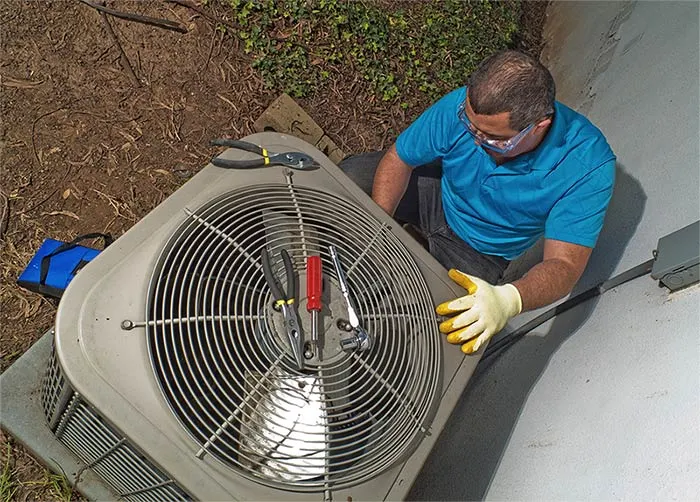June 27, 2023
HVAC Serial Numbers: Determining The Make, Model, and Age of Your HVAC System

Have you ever wondered about the origins of your HVAC system? Do you know its make, model, or even its age? Understanding these vital details can provide you with valuable insights into the heating and cooling system’s capabilities, maintenance requirements, and potential lifespan.
HVAC serial numbers serve as unique identifiers for individual units and can hold a wealth of information about your HVAC unit. Our dedicated and knowledgeable HVAC technicians from Bowman Mechanical are looking closer into the fascinating world of HVAC serial numbers and exploring how they can help you determine valuable information about your HVAC system.
Determining The Type of HVAC System
Determining the type of HVAC system you have is essential for understanding its functionality, installation requirements, and maintenance needs.
Split Systems
Split systems are the most common type of HVAC system found in residential and small commercial settings. As the name suggests, these systems are split into two main components: an indoor unit and an outdoor unit. Split systems are versatile and can be configured for both heating and cooling, using either a furnace or a heat pump.
Packaged Systems
Packaged systems, also known as self-contained units, are commonly used in commercial buildings or spaces with limited indoor space availability. Unlike split systems, all components of a packaged system are housed in a single outdoor unit. Packaged systems come in various configurations, such as gas/electric, heat pump, or all-electric, depending on the desired heating and cooling requirements. They are typically installed on rooftops or ground-level pads and are connected to the building’s ductwork for air distribution.
Ductless Mini-Split Systems
Ductless mini-split systems offer a flexible and efficient alternative to traditional HVAC systems, particularly in situations where installing ductwork is impractical or not desired.
These systems consist of an outdoor unit and one or more indoor units mounted on walls or ceilings within individual rooms or zones. The indoor units are connected to the outdoor unit through refrigerant lines, eliminating the need for ductwork. Ductless mini-split systems provide independent temperature control for each indoor unit, allowing for heating and cooling zones for customized comfort in different areas of a home or building.
Identifying the Make and Model of Your HVAC System
Identifying the make and model of your HVAC system is essential for obtaining accurate information about its specifications, compatibility with replacement parts, and accessing resources for HVAC troubleshooting or maintenance.
Locating the Unit’s Information
The first step is to find the manufacturer’s label or data plate on your HVAC system. This label is usually located on the exterior of the unit or on an access panel. Common locations include the front or side of the indoor air handler or furnace, the outdoor condenser unit, or the back of the unit in some cases. Check both the interior and exterior of the unit to ensure you locate the label.
Manufacturer’s Label and Data Plate
Once you find the manufacturer’s label or data plate, examine it closely. It typically contains important information such as the make, model, serial number, and other specifications specific to your HVAC system. The make refers to the manufacturer or brand of the system, while the model represents the specific series or design of the unit. The serial number is a unique identifier that can provide additional details, including the manufacturing date or year.
Interpreting the Make and Model Details
Using the make and model information, you can identify the manufacturer of your HVAC system and gather further details about its features and capabilities. The make and model details allow you to access technical documentation, warranty information, and compatibility charts for replacement parts or upgrades. They also assist HVAC professionals in providing accurate assistance or troubleshooting guidance.
Online Resources and Databases for HVAC Identification
If you encounter difficulties in identifying your HVAC system’s make and model based on the information found on the manufacturer’s label, various online resources and databases can be helpful. HVAC manufacturers often provide online tools or databases where you can enter the serial number or other details to obtain specific information about your unit. Additionally, HVAC forums, community websites, or professional HVAC websites may offer resources or forums where you can seek assistance in identifying your system.
Decoding the Age of Your HVAC System
Decoding the AC age is crucial for understanding its lifespan, anticipated maintenance needs, and potential considerations for replacement.
The Importance of Determining the Age
Knowing the age of your HVAC system provides valuable insights into its condition and helps you plan for future maintenance or replacement. HVAC systems have an expected lifespan, and as they age, their efficiency may decline, leading to higher energy consumption and potential breakdowns. By determining the age, you can assess whether your system is approaching the end of its useful life and make informed decisions about repairs, upgrades, or replacements.
Manufacturer’s Date Code or Serial Number
The age of an HVAC system is often encoded in the manufacturer’s date code or serial number. The format and location of the date code can vary among manufacturers, but it typically contains information about the production date or year of the unit. Some manufacturers explicitly include the production date, while others use a code that requires interpretation.
Interpreting the Date Code
If the date code is straightforward and includes the production year, you can determine the age of your HVAC system directly. However, if the date code is encoded or uses a specific format, you’ll need to decipher it. Common date code formats include letters or numbers representing the month and year of manufacture, such as A for January, B for February, and so on. The corresponding year could be represented by a numerical digit or a specific letter assigned to each year.
Online Tools and Resources for Age Estimation
If you’re having trouble decoding the date code or need assistance in estimating the age of your HVAC system, various online tools and resources can help. Some HVAC manufacturers provide online databases or tools where you can enter the serial number or date code to obtain the age information directly. Additionally, HVAC forums, community websites, or professional HVAC websites may offer resources or forums where you can seek guidance from experts or fellow homeowners.
Tips for Maintaining Your HVAC System
HVAC system maintenance is crucial to ensure optimal performance, energy efficiency, and longevity.
Here are some essential tips for maintaining your HVAC system:
- Regularly change air filters
- Keep outdoor units clean
- Schedule professional preventative maintenance services
- Check and clean the evaporator and condenser coils
- Maintain proper airflow by eliminating obstructions to the system
- Monitor thermostat settings
- Monitor system performance
- Protect your system during off-seasons with protective covers
Benefits of Upgrading Your HVAC System
Upgrading your HVAC system can offer several significant benefits, including:
- Energy efficiency and cost savings
- Enhanced comfort and temperature control
- Improved indoor air quality
- Potential rebates and incentives
- Enhanced system reliability and durability
- Smart home integration and convenience
- Eco-friendly and sustainable solutions
Take Control of Your HVAC System with Bowman Mechanical Services
Whether you’re in need of professional maintenance, HVAC repairs, or considering an upgrade by installing a new geothermal HVAC system, our team of highly skilled technicians serves homeowners in the greater Raleigh area with their HVAC system needs.
Take control of your HVAC system with Bowman Mechanical Services and experience the difference in performance, comfort, and peace of mind.
Get started today by calling us at 919-944-4603 or filling out the form below to get started.

